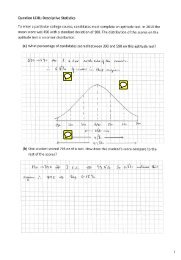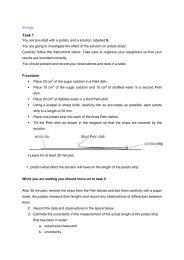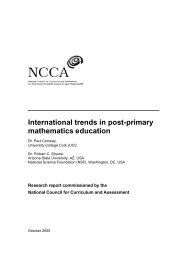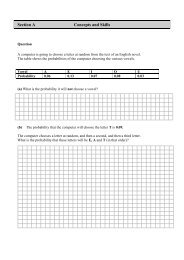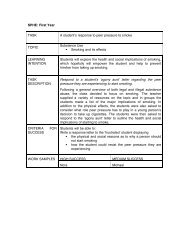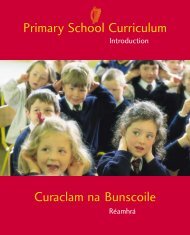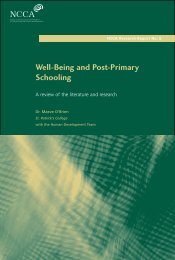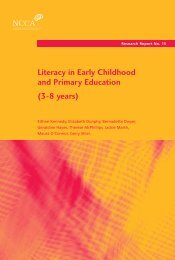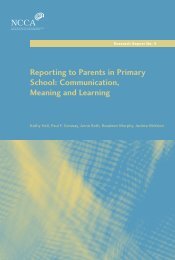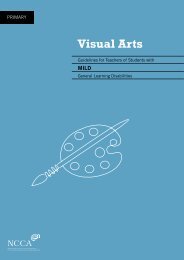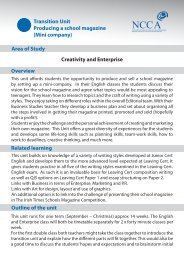- Page 1 and 2:
Upand Away A resource book for Engl
- Page 3 and 4:
Published by: Integrate Ireland Lan
- Page 5 and 6:
Contents Section 1 General informat
- Page 7 and 8:
2 Notes
- Page 9 and 10:
4 How can the class teacher and lan
- Page 11 and 12:
6 What are the challenges facing th
- Page 13 and 14:
8 How can we deal with problems of
- Page 15 and 16:
10 The role of the language support
- Page 17 and 18:
12 2. Integrating pupils The follow
- Page 19 and 20:
14 4. School - home communication I
- Page 21 and 22:
16 1 2 3 4 5 1 2 3 4 5 6 7 8 Checkl
- Page 23 and 24:
18 Learning English as a second lan
- Page 25 and 26:
20 What is the objective of languag
- Page 27 and 28:
22 First feedback from class teache
- Page 29 and 30:
24 The Silent (or non-verbal) Perio
- Page 31 and 32:
26 Organising the timetable for lan
- Page 33 and 34:
28 The principal purpose of languag
- Page 35 and 36:
30 Name of teacher: Class: Name of
- Page 37 and 38:
32 Name of teacher: Class: Name of
- Page 39 and 40:
34 Notes
- Page 41 and 42:
The curriculum framework for langua
- Page 43 and 44:
38 Global benchmarks of communicati
- Page 45 and 46:
40 Global scales of underlying ling
- Page 47 and 48:
42 UNDERSTANDING SPEAKING WRITING U
- Page 49 and 50:
44 UNDERSTANDING SPEAKING WRITING U
- Page 51 and 52:
46 UNDERSTANDING SPEAKING WRITING U
- Page 53 and 54:
48 UNDERSTANDING SPEAKING WRITING U
- Page 55 and 56:
50 UNDERSTANDING SPEAKING WRITING U
- Page 57 and 58:
52 UNDERSTANDING SPEAKING WRITING U
- Page 59 and 60:
54 UNDERSTANDING SPEAKING WRITING U
- Page 61 and 62:
56 Notes
- Page 63 and 64:
58 ✓ ✓ ✓ My First English Boo
- Page 65 and 66:
60 Classroom activities using flash
- Page 67 and 68:
62 Pronunciation and rhythm (speaki
- Page 69 and 70:
64 Happy families (speaking - askin
- Page 71 and 72:
66 Twenty questions (speaking - ask
- Page 73 and 74:
68 ✁ ear nose eye mouth
- Page 75 and 76:
70 ✁ pen pencil case copy book wa
- Page 77 and 78:
72 ✁ shorts short-sleeved shirt l
- Page 79 and 80:
74 ✁ sandals cap socks skirt
- Page 81 and 82:
76 ✁ zip apple banana carrots
- Page 83 and 84:
78 ✁ ice cream burger cake fish
- Page 85 and 86:
80 ✁ fish and chips lemon cornfla
- Page 87 and 88:
82 ✁ square circle triangle bus
- Page 89 and 90:
84 ✁ snowman egg nest flower
- Page 91 and 92:
86 ✁ pig rabbit lion frog
- Page 93 and 94:
88 ✁ bird cat dog cow
- Page 95 and 96:
90 Word stress 1 Resources Laminate
- Page 97 and 98:
92 Using stories 2 - for pupils lea
- Page 99 and 100:
94 ✁ Worksheet A
- Page 101 and 102:
96 What is the European Language Po
- Page 103 and 104:
98 Using the ELP with individual pu
- Page 105 and 106:
Sample activities for European Lang
- Page 107 and 108:
102 ELP page 8 WHERE I use and lear
- Page 109 and 110:
104 ELP page 10 Myself Draw a pictu
- Page 111 and 112:
106 ELP page 12 Food and clothes Us
- Page 113 and 114:
108 ELP page 15 Weather + ELP page
- Page 115 and 116:
110 ELP page 18 The local and wider
- Page 117 and 118:
112 ELP page 21 Animals and plants
- Page 119 and 120:
114 Notes
- Page 121 and 122:
116 Drawing materials - e.g. crayon
- Page 123 and 124:
118 It is important to develop reso
- Page 125 and 126:
120
- Page 127 and 128:
122
- Page 129 and 130:
124 I do not like Circle 4 things t
- Page 131 and 132:
126 ✓
- Page 133 and 134:
128
- Page 135 and 136:
130 Fill in each box with the corre
- Page 137 and 138:
132
- Page 139 and 140:
134
- Page 141 and 142:
136
- Page 143 and 144:
138 Can you spot the 5 differences?
- Page 145 and 146:
140 Can you spot the 5 differences?
- Page 147 and 148:
142 My meals
- Page 149 and 150:
144
- Page 151 and 152:
146
- Page 153 and 154:
148 Notes
- Page 155 and 156:
150 This section contains the follo
- Page 157 and 158:
152 Find these words in the grid.
- Page 159 and 160:
154 What do you see in the picture?
- Page 161 and 162:
156 Making multiple-choice question
- Page 163 and 164:
158 What does it mean? What do the
- Page 165 and 166:
160 Look at the clues. Write the an
- Page 167 and 168:
162 Class Organisation Pairs/small
- Page 169 and 170:
164 Clues 1. 2. 3. 4. 5. Write your
- Page 171 and 172:
166 The purpose of the following ac
- Page 173 and 174:
168 Autumn: Shorter days Falling le
- Page 175 and 176:
170 For drinking For washing For ce
- Page 177 and 178:
172 Months of the year Winter What
- Page 179 and 180:
174 Experiments with water Key word
- Page 181 and 182:
176 Look at Unit 10 - The Telephone
- Page 183 and 184:
178 Look at Unit 19 - Milk’s the
- Page 185 and 186:
180 Fionn and the Giolla Deacair He
- Page 187 and 188:
182 Example of Yes/No exercise. Rea
- Page 189 and 190:
184 Reading Read paragraph . Put th
- Page 191 and 192:
186 Notes
- Page 193 and 194: 188 Introduction This section is in
- Page 195 and 196: 190 Names and countries Class organ
- Page 197 and 198: 192 Stage 2 - Speaking and reading
- Page 199 and 200: 194 ✁ • • • • • k l m n
- Page 201 and 202: 196 a b c d e f g h i j k l m n o p
- Page 203 and 204: 198 Developing writing skills - Wor
- Page 205 and 206: a b c d e f g h i j k l m n o p q r
- Page 207 and 208: a b c d e f g h i j k l m n o p q r
- Page 209 and 210: a b c d e f g h i j k l m n o p q r
- Page 211 and 212: a b c d e f g h i 206 Worksheet E a
- Page 213 and 214: s t u v w x y z 208 Worksheet E a b
- Page 215 and 216: 210 Cycle 2. What is this? - object
- Page 217 and 218: 212 Class organisation Whole class.
- Page 219 and 220: 214 Class organisation Whole class.
- Page 221 and 222: 216 Class organisation Whole class.
- Page 223 and 224: 218
- Page 225 and 226: ✁ 220 armchair cushion pot bed bi
- Page 227 and 228: 222 1. is in the kitchen. 2. is in
- Page 229 and 230: 224 Where 1. Where is ? 2. Where is
- Page 231 and 232: 226 1. The table is in the kitchen.
- Page 233 and 234: 228 Where 1. Where is the table? 2.
- Page 235 and 236: 230 3. Developing reading and writi
- Page 237 and 238: 232 Match the word: List A List B m
- Page 239 and 240: 234 ✁ ✁ ✁
- Page 241 and 242: 236 Notes
- Page 243: 238 Introduction Generally speaking
- Page 247 and 248: 242 Dictionaries It is very importa



